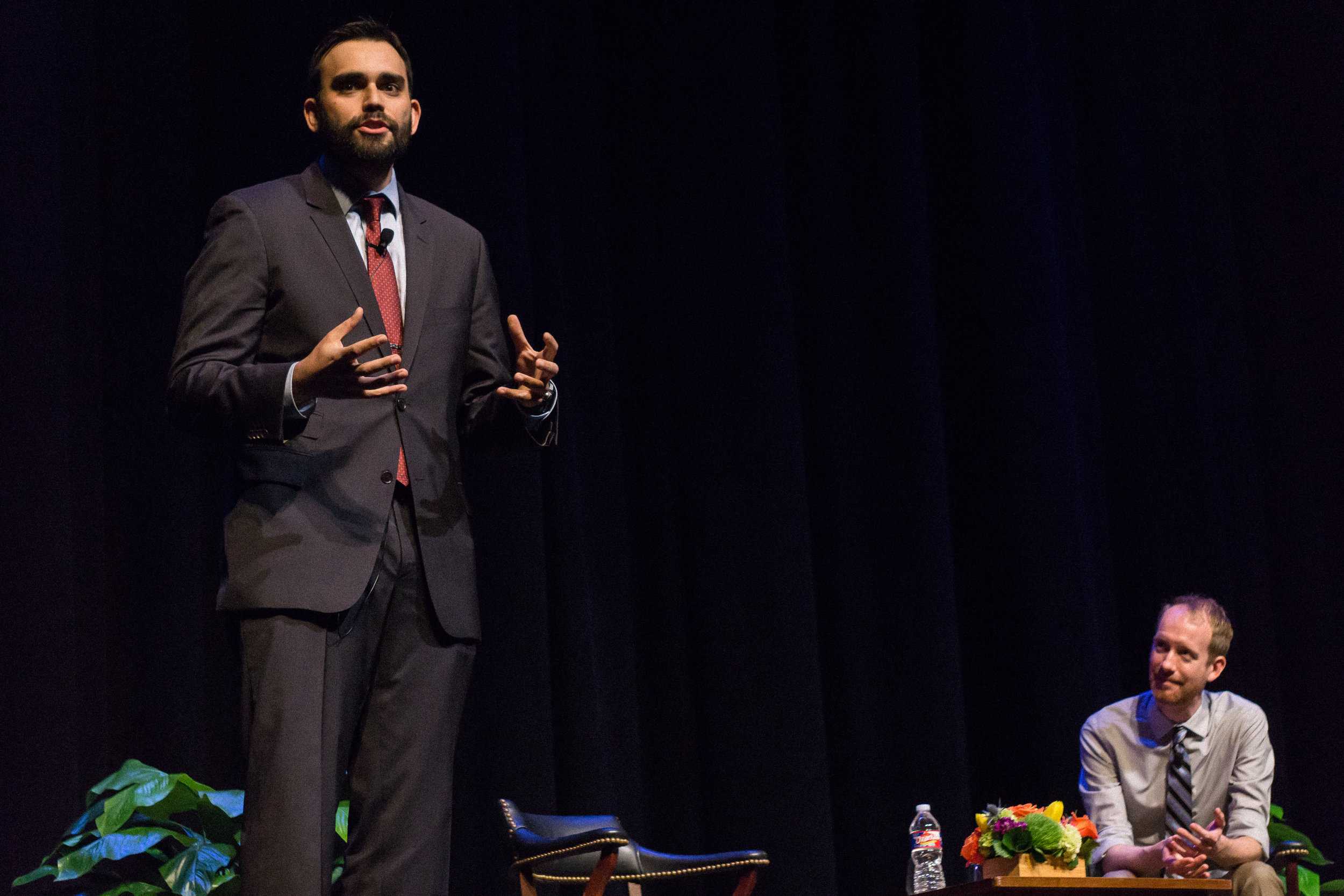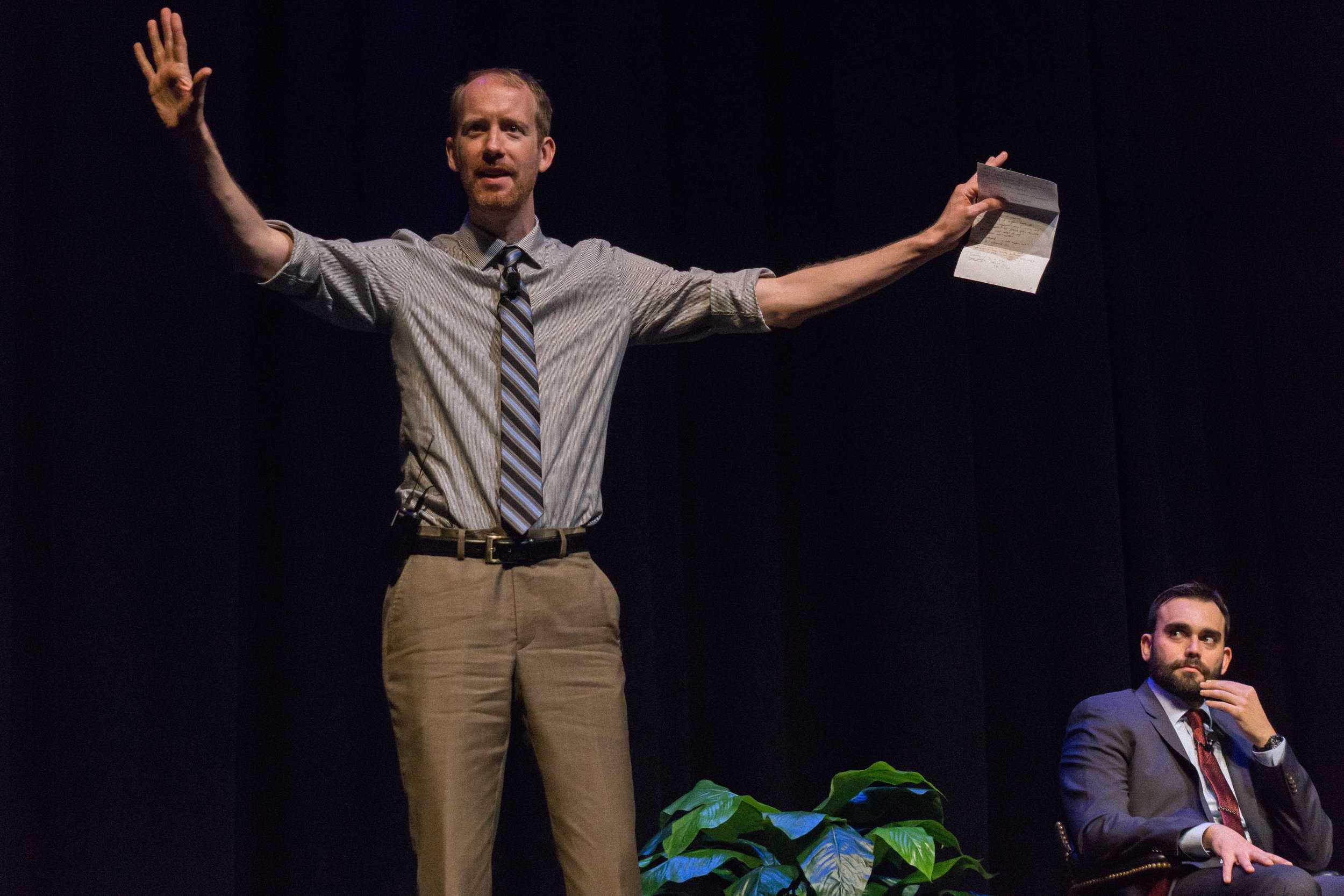Andrew Aydin discusses working with Nate Powell to illustrate the book.
Two of the masterminds behind the acclaimed graphic memoir “March,” Andrew Aydin and Nate Powell, visited the University of Texas at Austin on Friday, March 24, and shared their inspiration for creating the comic trilogy that chronicled the life of civil rights leader and Congressman, John Lewis.
Story by Allyson Waller
Photos by Caleb Guadarrama
Aydin and Powell each shared how the idea of the memoir became reality and the steps it took to accurately portray Lewis’ life experiences. The idea for the comic originally came during Lewis’s 2008 re-election campaign, in which Aydin served as the congressman’s press secretary. When the team was considering how to reach out to young people, Aydin recommended that Lewis write a comic book, showcasing how leaders of the Civil Rights Movement successfully created systemic change. Lewis accepted Aydin’s recommendation later in the campaign. “I think we have to use this medium to teach these stories,” Aydin said, recalling his suggestion from 2008. “If it worked during the movement, why can’t it work again?”
A copy of MARCH ON, a three part graphic novel that tells the story of Civil Rights activists and their commitments to justice and equality.
Aydin sighted the 1957 comic, “Martin Luther King and The Montgomery Story” as inspiration for “March” comics and how the 1957 comic was used as a blueprint for non-violent protests. “One of the key parts of non-violence is that put you down, in writing, what it is you’re trying to do and why and what it is you want, and so we did that,” Aydin said. “We modeled our whole endeavor on ‘Martin Luther King and the Montgomery Story’ and how it was used.”
Lewis was set to appear at the event, but he remained in Washington D.C. due to the recent vote to repeal the Affordable Healthcare Act. Despite Lewis’ absence, the event still highlighted how the power of written word can bring awareness to the struggles of the past and relate them to the issues in the present.
The event began with a screening of the documentary, “Get in the Way: The Journey of John Lewis,” which premiered on PBS on Feb. 10. The film examined how Lewis’s actions and non-violent tactics led to change concerning the injustices of black people during the Civil Rights Movement, and how he remains an influential proponent of equality today.
Those in attendance were keen in learning more about Lewis’ life and how he served as an unequivocal voice for equal rights. “I think it’s a great opportunity, especially attending a predominantly white institution,” psychology junior Lauryn Reese said. “It’s always great to learn more about your culture.”
After the screening, Aydin and Powell came on stage to give in-depth perspectives of the creation of “March.” Both captivated the audience with their stories and recollections of how they formulated the historic life of Lewis in a unique literary form. “Comics have for quite a while, been far beyond a point in which they need to argue for their legitimacy as an art form, as a storytelling form,” Powell said. “We’re very proud and honored as comic book nerds that we get to be a small part of putting that argument to rest.”
Nate Powell, illustrator of “March” speaks on the importance of graphic novels in educating younger audiences.
A highlight in the conversation came when Aydin mentioned the current “activist generation” and how even though some young people have an urge to protest and advocate for social and legislative changes beyond their years of higher education, “corporate bondage,” such as student loan debt, can hinder them. “We have a litany of issues that we need to address as a society, as a culture, and we need an activist generation to do it,” Aydin said. “In order to create that activist generation we have to lift the burden of debt.”
Towards the end of Aydin and Powell’s conversation they called on young people, who are at a pivotal age group in today’s society, to eagerly step up and be a catalyst for positive change. “History does tend to repeat itself,” Reese said. “We still have a lot of work [and] a lot of issues that need to be solved. I think it’s good to bring the new generation to be involved more.”














































